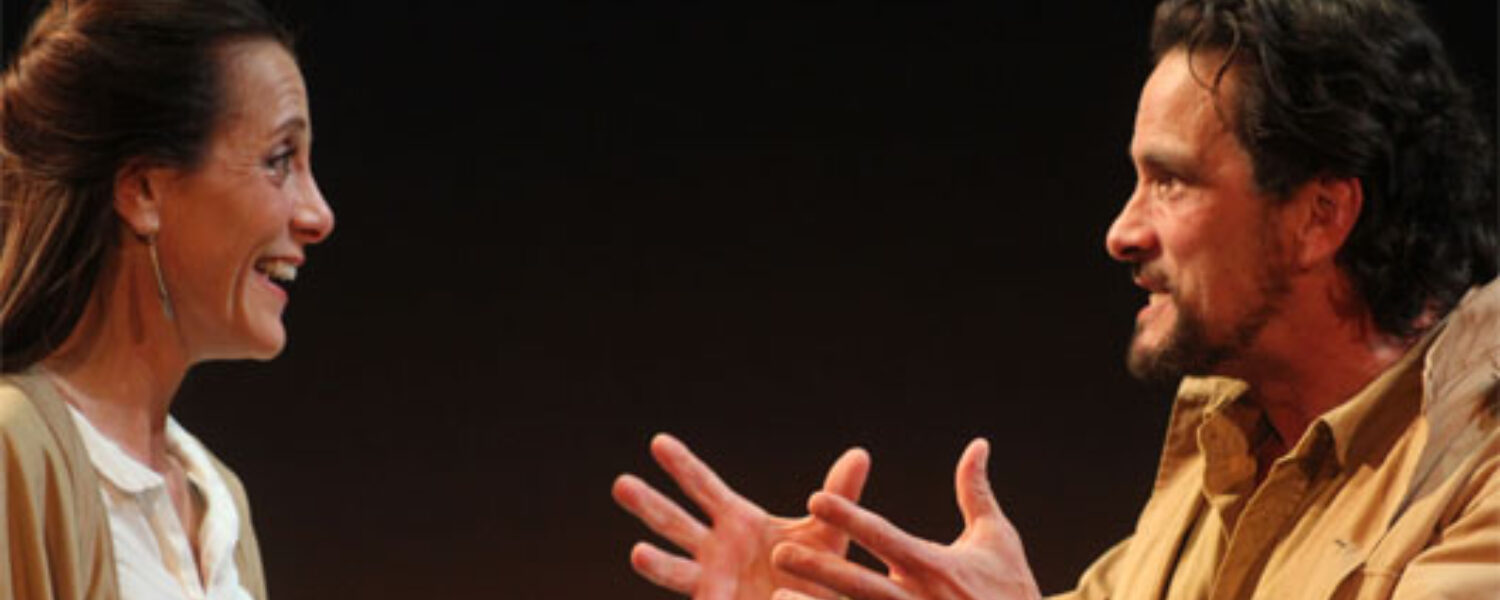
As explained in her Director's notes, when Antony and Cleopatra director Kate Buckley was tasked with adapting Shakespeare's original 34-member cast and stripping it down to seven actors, her co-writer (and the actor playing Antony) Jim DeVita, 'plunged in without taking a breath
While Jim always leaves memorable performances on the boards of American Players Theatre, he also works extensively behind the scenes directing and writing. Jim's list of playwright credits is lengthy, and includes past APT productions such as In Acting Shakespeare, The Desert Queen, The Gift of the Magi and, currently in repertory in the Touchstone Theatre, the production of Dickens in America: Adapted from his works and words.
During a recent Bard Talk at APT, Jim discussed his work adapting scripts. Here is a small excerpt of what he had to say:
I started out by adapting many big titles like Swiss Family Robinson, the Little House books, Huck Finn, Tom Sawyer, I kind of learned by trial and error, working on those plays. So, adaptations are not new to me, but Shakespeare is - this is the first time I've tried. We love to get our mouth around the words in that indoor space, we've been working for 20 years on this 1200-seat outdoor theatre and it takes a certain heightened level of speaking for us try and access Shakespeare outside, but inside its like gold.
We can't do a full Shakespeare inside the Touchstone. We really can't have more then seven actors in the Touchstone, and economically it's not feasible. About three years ago we asked if we could adapt something or at least get an idea of it. I knew I was approaching the right age for Antony, I had wanted to play him for awhile and I'm actually his age this year.
The first thing I wanted to see was if it was mathematically even possible. Could you do that show with seven people? I've seen a lot of adaptations of Shakespeare and I'm not a fan of seven people playing 30 roles, running off and putting on a beard, and then coming back on stage. It can work in a comedy, but not so much in a tragedy. You can't hide in the Touchstone, it's only 200 seats. It's very unforgiving in that way. So, my idea, which has been done before too, is to take one character and compile other characters into it. Try and get the exposition and the story points into this one character. Rather than having 30 characters and seven actors, we have seven characters in this play.
When it came time for rehearsal, we thought the script was ready to be produced. But it was not. We spent another week and a half or so, really right up until the opening, toying with the script. What's great is once you get actors involved, they're looking at it really specifically just from their arc of the story, they are looking at it in fine detail. They brought up things that didn't make sense, or pointed out that this character wouldn't say this.
This is a new play, basically. If you're familiar with Antony and Cleopatra, it's a huge play. It's epic. How do you do that play with seven people? As the adaptor, I was very interested in the relationship between Antony and Cleopatra and some of the outside pressures that shape their lives, and also the bedroom politics between these two people who are kind of crazy about and around each other, and how their decisions shape the world. So, I concentrated on the relationship between Antony and Cleopatra. Anyone could have adapted this play differently. But I was interested in what that relationship might be, late in life to fall in love. In my opinion, like you're 17 again, what if that happened when you're 50? What does that feel like?
It was hard, I didn't think it would be as hard as it was, to be honest with you. I've done a lot of adaptations, but because Antony and Cleopatra is so massive, I couldn't see the little holes that would happen, the domino effects that, when you remove that line in the fourth act, something doesn't make sense.
I look for the tragedy in the comedies and the comic in the tragedies. I think the more serious you take a comic character-the more dignity you give a comic character-the funnier they are. They don't know they are being funny, that's my little trick. One of the greatest pieces of advice I got from a director was when I was playing Romeo and I was a little morose, he came up to me one day during rehearsal and said 'Romeo hasn't read the play, he doesn't know he's in a tragedy.' It's really smart directing. As a storyteller, whenever I do a big role like Richard III or Romeo, and I know that the audiences have three hours of listening to me, I better not be just one sad character, as a storyteller, I look for variety.
To purchase tickets for American Players Theatre, call the Box Office at 608.588.2361 or visit americanplayers.org.
